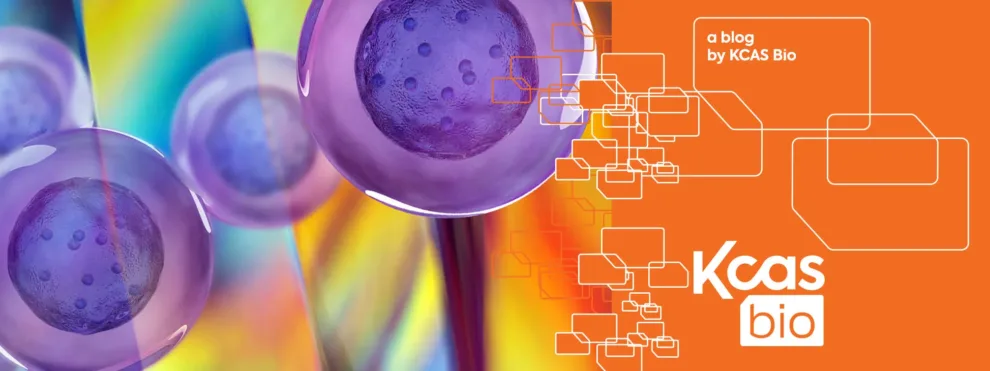Flow cytometry is a highly sophisticated laboratory technique. Scientists use this procedure to analyze and quantify certain physical and chemical characteristics of cells or particles.
In recent years, the prominence of flow cytometry has grown significantly, and understanding why is pivotal.
The recognition of the technique’s importance, especially in the pharmaceutical community, has done much to drive its increased prominence. Additionally, flow cytometry is widely utilized in clinical diagnostics, drug development, and biomedical research.
Recent technological advancements have played an especially crucial role. These advancements, in particular, have enabled researchers at KCAS Bioanalytical Services to explore some exciting new possibilities.
Flow Cytometry: A Multipurpose Analytical Tool
Flow cytometry enables researchers to examine and sort individual cells based on multiple parameters simultaneously. This flexibility allows for the identification of different cell types within a heterogeneous sample.
That’s one reason why flow cytometry has quickly become an invaluable tool for studying the immune system, characterizing cell populations, and investigating various diseases at the cellular level.
However, it’s important to keep in mind that flow cytometry is not just about the present drug currently in development. Rather, it’s about understanding the mechanisms of action for future generations of drugs.
As a result, this technique is widely employed in various scientific and medical disciplines for the detailed study of cells. It is especially prevalent in the fields of immunology, oncology, hematology, and microbiology.
Expanding Cytometry’s Crucial Role in Clinical Trials
Though already accepted as a critical lab technique, the highly skilled researchers at KCAS Bio continue to build upon the pivotal role of flow cytometry in modern clinical trials.
Flow cytometry allows researchers to understand how the immune system interacts with new drugs. However, it also serves as a prognosticator and a key factor in identifying responders.
The mechanism of action during clinical trials is often complex. Pharmaceutical companies and their investors rightly demand hard data when making their decisions. Flow cytometry provides a unique space for in-depth discussions beyond traditional publications.
Supporting the Growing Prominence of Flow Cytometry
Flow cytometry’s increasing prominence can be attributed to advancements in technology and a greater recognition of its importance. Technological innovations enable KCAS researchers to delve deeper into the immune system’s critical role in drug development.
Moreover, the pharmaceutical community’s realization of flow cytometry’s power in understanding mechanisms of action has fueled its proliferation across companies, as highlighted by KCAS clients’ experiences.
Building Community and Sharing Knowledge
Flow cytometry is not just a technique; it’s more accurately considered a growing community. Throughout its history, KCAS has consistently emphasized the value of interactions within this community. Both new faces and returning clients contribute to a collaborative learning environment.
KCAS firmly believes that there is more than enough work for companies operating in this space. The ongoing exchange of feedback and the validation that KCAS’s data aids in therapeutic development underscore the shared goal of advancing science for the betterment of humanity.
Partnership and Collaboration
When everything is functioning as it should, a symbiotic relationship develops between pharmaceutical companies and Contract Research Organizations (CROs) like KCAS. This partnership goes beyond meeting timelines; it involves communication, standardization, and continuous improvement that benefits both players.
Intentionally taking a collaborative approach enhances the robustness and reproducibility of flow cytometry applications. This aligns with the needs of both sides of the coin. At KCAS, we’re strong believers in pursuing a Win-Win scenario.
Contributing to the Ongoing Evolution of Flow Cytometry Instruments
The evolution of flow cytometry instrumentation, from the early days of manually operated devices to today’s sophisticated, high-dimensional analyzers, owes much to a healthy feedback cycle.
Embracing a spirit of cooperation and continuous improvement, KCAS researchers are characteristically quick to recount their experiences with different instruments.
Highlighting the learning curve associated with current technology can help demystify flow cytometry. The result is an enhanced appreciation that comes with progressing confidently through the various stages of complexity.
A History of Innovation That Speaks for Itself
KCAS Bioanalytical Services has a long-standing presence in the field of flow cytometry. It stands as a clear testament to the ongoing KCAS commitment to advancing the science underlying flow cytometry.
With over 11 years in Philadelphia and 40 years in the Kansas City area, KCAS Bio has actively participated in the evolution of this technique and remains at the forefront with cutting-edge instrumentation. As a pioneering force in flow cytometry, KCAS invites researchers, pharmaceutical companies, and industry professionals to explore the possibilities of this transformative technique.
Whether you are interested in a no-obligation consultation, a tour of our facilities, or simply seeking more information, KCAS Bio stands ready to contribute to your scientific journey. Contact us today to unlock the full potential of flow cytometry in your research and drug development projects.
If you have any questions about these services or any others offered by KCAS, please use the form below. Thank you!

